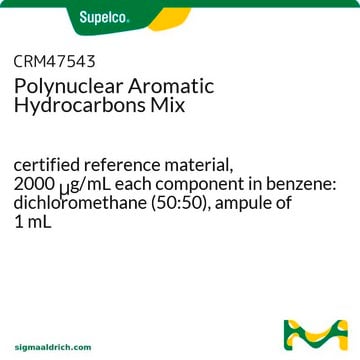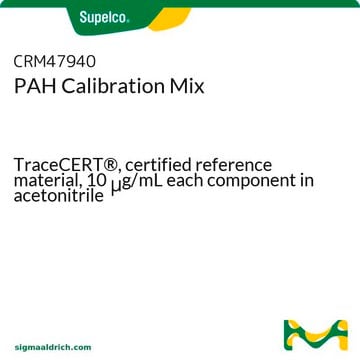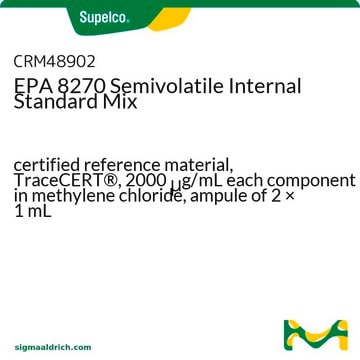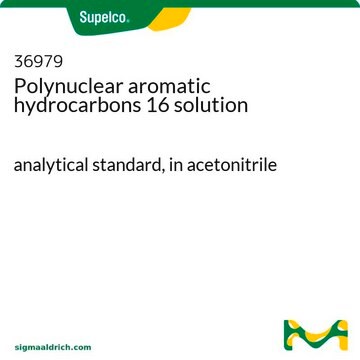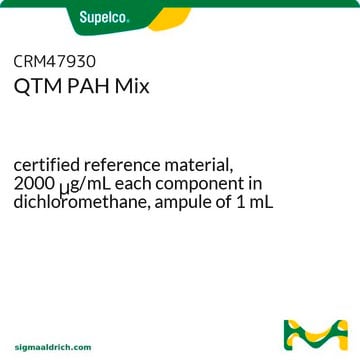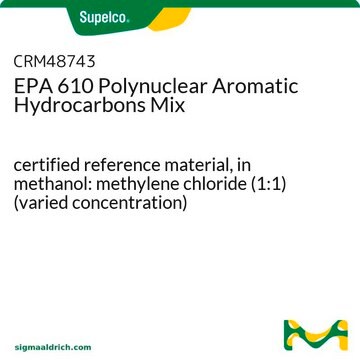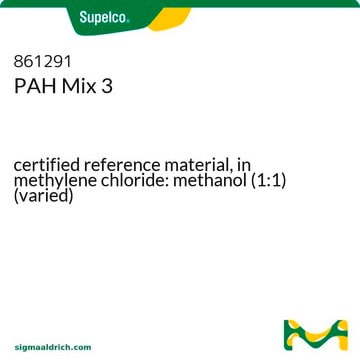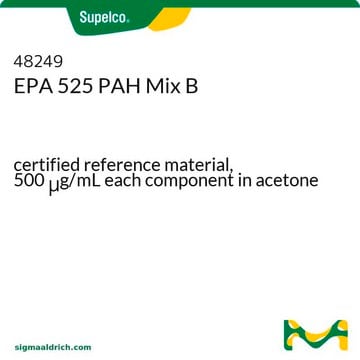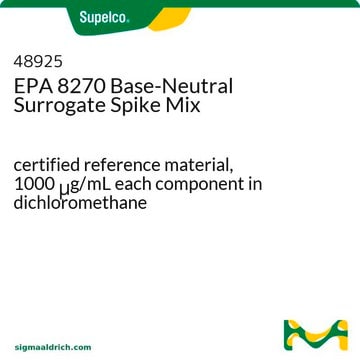CRM48905
Polynukleare aromatische Kohlenwasserstoff-Mischung
certified reference material, TraceCERT®, 2000 μg/mL each component in methylene chloride: benzene (1:1)
Synonym(e):
PNAs
Anmeldenzur Ansicht organisationsspezifischer und vertraglich vereinbarter Preise
Alle Fotos(1)
About This Item
UNSPSC-Code:
41116107
NACRES:
NA.24
Empfohlene Produkte
Qualität
certified reference material
TraceCERT®
Qualitätsniveau
Produktlinie
TraceCERT®
Analysenzertifikat (CofA)
current certificate can be downloaded
Leistungsmerkmale
standard type calibration
Verpackung
ampule of 1 mL
Konzentration
2000 μg/mL each component in methylene chloride: benzene (1:1)
Methode(n)
HPLC: suitable
gas chromatography (GC): suitable
Anwendung(en)
environmental
Format
multi-component solution
Lagertemp.
2-8°C
Suchen Sie nach ähnlichen Produkten? Aufrufen Leitfaden zum Produktvergleich
Anwendung
Refer to the product′s Certificate of Analysis for more information on a suitable instrument technique. Contact Technical Service for further support.
Sonstige Hinweise
This Certified Reference Material (CRM) is produced and certified in accordance with ISO 17034 and ISO/IEC 17025. All information regarding the use of this CRM can be found on the certificate of analysis.
Rechtliche Hinweise
TraceCERT is a registered trademark of Merck KGaA, Darmstadt, Germany
Analyt
Beschreibung
Acenaphthene
Acenaphthylene
Anthracene
Benz[a]anthracene
Benzo[b]fluoranthene
Benzo[k]fluoranthene
Benzo[ghi]perylene
Benzo[a]pyrene
Chrysene
Dibenz[a,h]anthracene
Fluoranthene
Fluorene
Indeno[1,2,3-cd]pyrene
Naphthalene
Phenanthrene
Pyrene
Alle anzeigen (16)
Signalwort
Danger
Flammpunkt (°F)
12.0 °F
Flammpunkt (°C)
-11.1 °C
Choose from one of the most recent versions:
Besitzen Sie dieses Produkt bereits?
In der Dokumentenbibliothek finden Sie die Dokumentation zu den Produkten, die Sie kürzlich erworben haben.
Kunden haben sich ebenfalls angesehen
Abhrajyoti Tarafdar et al.
Environmental geochemistry and health, 42(6), 1691-1704 (2019-05-28)
Children can get affected by polycyclic aromatic hydrocarbons (PAHs) while they interact with play area soil/rubber surfacing and exposed to PAHs by dermal contact, inhalation and hand-to-mouth activity. A comparative study has been conducted on PAHs profiling and probable cancer
José Beirão et al.
Environmental pollution (Barking, Essex : 1987), 241, 521-528 (2018-06-09)
The effects of petroleum aromatic hydrocarbons (PAHs) on the embryonic and larval life stages of teleosts have been extensively examined. However, very little work has been conducted on how spilled oil affects fish sperm and there is no related knowledge
St Naydenova et al.
Journal of environmental science and health. Part A, Toxic/hazardous substances & environmental engineering, 55(4), 498-509 (2019-12-19)
A GC-MS method in SIM mode is proposed for routine analysis of nineteen polycyclic aromatic hydrocarbons (PAHs) in particulate matter with an aerodynamic diameter of 10 µm. The latter is collected on Whatman® QM-A quartz filters via OPSIS SM200 sampler during
Unser Team von Wissenschaftlern verfügt über Erfahrung in allen Forschungsbereichen einschließlich Life Science, Materialwissenschaften, chemischer Synthese, Chromatographie, Analytik und vielen mehr..
Setzen Sie sich mit dem technischen Dienst in Verbindung.